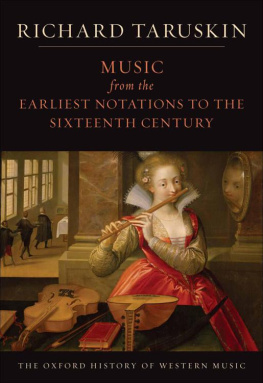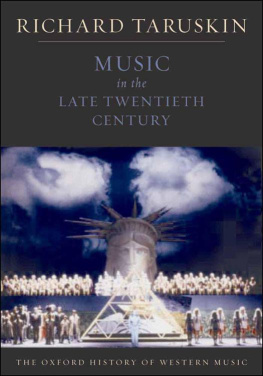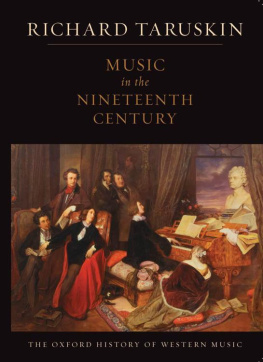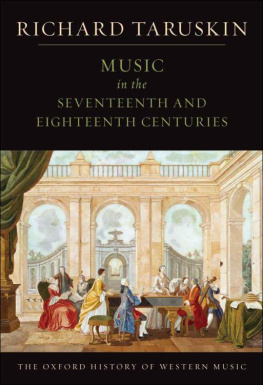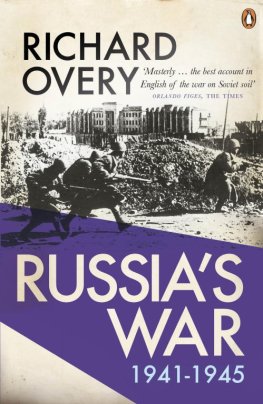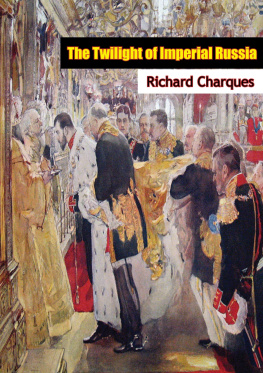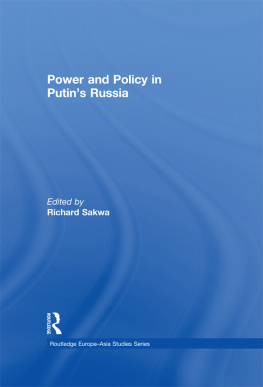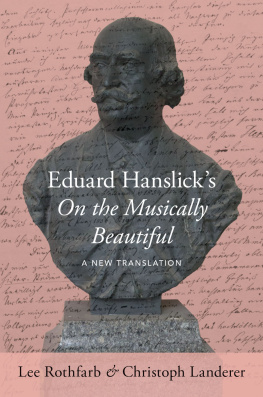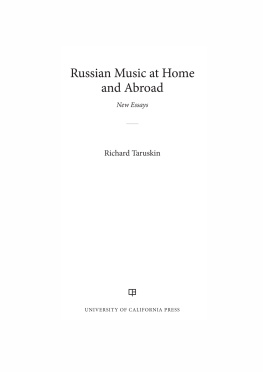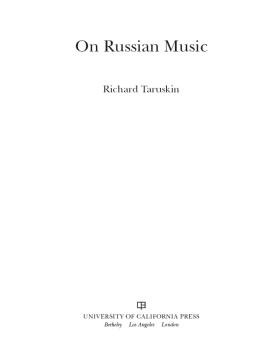Richard Taruskin - Defining Russia Musically
Here you can read online Richard Taruskin - Defining Russia Musically full text of the book (entire story) in english for free. Download pdf and epub, get meaning, cover and reviews about this ebook. year: 2020, publisher: Princeton UP, genre: Religion. Description of the work, (preface) as well as reviews are available. Best literature library LitArk.com created for fans of good reading and offers a wide selection of genres:
Romance novel
Science fiction
Adventure
Detective
Science
History
Home and family
Prose
Art
Politics
Computer
Non-fiction
Religion
Business
Children
Humor
Choose a favorite category and find really read worthwhile books. Enjoy immersion in the world of imagination, feel the emotions of the characters or learn something new for yourself, make an fascinating discovery.
- Book:Defining Russia Musically
- Author:
- Publisher:Princeton UP
- Genre:
- Year:2020
- Rating:5 / 5
- Favourites:Add to favourites
- Your mark:
- 100
- 1
- 2
- 3
- 4
- 5
Defining Russia Musically: summary, description and annotation
We offer to read an annotation, description, summary or preface (depends on what the author of the book "Defining Russia Musically" wrote himself). If you haven't found the necessary information about the book — write in the comments, we will try to find it.
Defining Russia Musically — read online for free the complete book (whole text) full work
Below is the text of the book, divided by pages. System saving the place of the last page read, allows you to conveniently read the book "Defining Russia Musically" online for free, without having to search again every time where you left off. Put a bookmark, and you can go to the page where you finished reading at any time.
Font size:
Interval:
Bookmark:



Copyright 1997 by Princeton University Press
Published by Princeton University Press, 41 William Street,
Princeton, New Jersey 08540
In the United Kingdom: Princeton University Press,
3 Market Place, Woodstock, Oxfordshire 0X20 1SY
All Rights Reserved
Third printing, and first paperback printing, 2000
Paperback ISBN 0-691-07065-2
The Library of Congress has cataloged the cloth edition of this book as follows
Taruskin, Richard.
Defining Russia musically : Historical and hermeneutical essays / Richard Taruskin.
p. cm.
Includes bibliographical references and index.
ISBN 0-691-01156-7 (cloth : alk. paper)
1. MusicRussiaHistory and criticism.
I. Title. ML300.T37 1997
780.947dc20 96-41182
www.pup.princeton.edu
ISBN-13: 978-0-691-07065-0 (pbk.)
eISBN: 978-0-691-21937-0
ISBN-10: 0-691-07065-2 (pbk.)
R0
For Caryl and Karol
who have set me so many good examples
and for P. C. van den Toorn
public adversary, private pal
Music reaches its high-water mark only among men who have not the ability or the right to argue.
Friedrich Nietzsche, The Wanderer and His Shadow (1880)
If Russia is to be saved, it will only be as a Eurasian power and only through Eurasianism.
Lev Gumilyov (1992)
Ive no doubt that Russia has not lost the opportunity to reach prosperity and democracy. But it can do so only under one condition: a realization of itself as a true part of Western civilization.
Vassily Aksyonov (1994)
Its been very nice, the reception these stories have got, because, broadly speaking, people have managed to respond to them as stories rather than messages in a bottle. Its been very nice to be a writer again. I feel like everything I say or do is treated as an allegory of my situation. The point is that Im trying to not be defined explicitly by this situation.
Salman Rushdie, on East, West (1994)
Russia is so Russian!
John Updike (1966)

xi

THE SECULAR fine art of music came late to Russia. To all intents and purposes, its history there begins in 1735, when the Empress Anne (Anna loannovna, reigned 1730-40) decided to import a resident troupe of Italian opera singers to adorn her court with exotic and irrational entertainments. The first such performance took place at the Winter Palace in St. Petersburg on the empresss birthday, 29 January (Old Style) 1736. It was Laforza dellamore e dellodio, an opera seria by Francesco Araja, the leader of the troupe. That was the beginning of secular music in Russia as a continuous, professional, and literate artistic tradition.
That tradition, although it thrived at court under a series of distinguished maestri di cappella (Manfredini, Galuppi, Traetta, Paisiello, Sarti, Cimarosa), was of no particular importance to Russia at large, and Russia, beyond providing a few favored foreigners with brief plum appointments, was of no importance to it. The practice of European art music had little or no role to play in the formation of Russian national consciousness, which did not even begin to be a factor in Russian culture until the reign of Catherine the Great was well under way.
It was only the spread of Europeanized mores and attitudes beyond the precincts of the court, and the increased Russian presence in Europe following the Napoleonic Wars, that really rooted European high culture in Russian urban centers and led beyond receptivity to actual Russian productivity in the European arts. The institutional means for maintaining that productivity in music were established in the 1860s, chiefly by dint of Anton Rubinsteins heroic labors. By the last decade of the nineteenth century Russian composers of European art musicparticularly Rubinstein himself and Chaikovsky, the outstanding early graduate of Rubinsteins conservatoryhad achieved world prominence and prestige. As fine a professional education in music could be had in Russia as anywhere else on the continent, and Russias eminence as a habitat and training ground for first-rate talent (chiefly violinistic and pianistic talent) would actually begin to eclipse that of other nations.
And yet the profession that Rubinstein, Chaikovsky, and all those violinists and pianists followed had only just achieved legitimacy in Russia. Only since the 1860s had Russian law recognized the existence of any such animal as a Russian composer. And only since the 1770s at the earliest had there even been such a thing as a Russian who worked professionally at music as a European fine art. If Vasiliy Pashkevich (1742-97)Vincenzo Manfredinis apprentice, who wrote singspiels to texts by Catherine the Greats court poets and eventually by the Empress herselfturns out to have been of Russian birth rather than an immigrant Pole as his name (Paszkiewicz) suggests, then he was the oldest person to whom that description could be applied.
If not, then the distinction belongs to Maxim Sozontovich Berezovsky (1745-77), the son of a serf, who trained at court with Galuppi (first as a sopranist and then, very exceptionally, as a composer) and was sent to Bologna at the Empress Catherines expense in 1766 to study with Padre Martini. In the event he received instruction not from Martini himself but from the latters assistant, Stanislao Mattei; but he was awarded the diploma of the Accademia Filarmonica in 1771, one year after Mozart, and saw his journeyman opera, to Metastasios old Demofoonte libretto, successfully produced in Livorno during the 1773 Carnival. (He was then summoned home to take over the Imperial Court Chapel Choir; his suicide at the age of thirty-one made him a legendary figure and, beginning in the 1840s, the subject of novels, plays, and eventually movies.) Berezovsky was thus the earliest Russian-born composer of opera; but since his opera went unheard in Russia, it cannot be said to have contributed to the development of any indigenous practice of European art music there.
The same goes for the opere serie of Dmitriy Bortnyansky (1751-1825), another precocious son of a serf from the same Ukrainian village as Berezovsky, who followed him to Italy and eventually succeeded him as Imperial Court Chapel choirmaster. The historical significance of both Berezovsky and Bortnyansky lay in another area; with their choral concertos they played a leading role in Westernizing the much older tradition of Russian Orthodox sacred singing (peniye, long distinguished in the Russian vocabulary from the secular art of muzika). Yevstigney Fomin (1761-1800), who is treated at some length in the first part of this book, was a junior member of this first generation of native-born Russian practitioners of the European fine art of music, all men of low birth who pursued their careers in conditions of indentured, quasi-military service.
Font size:
Interval:
Bookmark:
Similar books «Defining Russia Musically»
Look at similar books to Defining Russia Musically. We have selected literature similar in name and meaning in the hope of providing readers with more options to find new, interesting, not yet read works.
Discussion, reviews of the book Defining Russia Musically and just readers' own opinions. Leave your comments, write what you think about the work, its meaning or the main characters. Specify what exactly you liked and what you didn't like, and why you think so.


